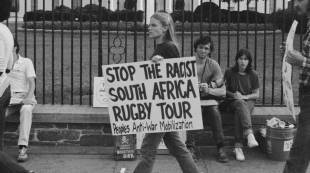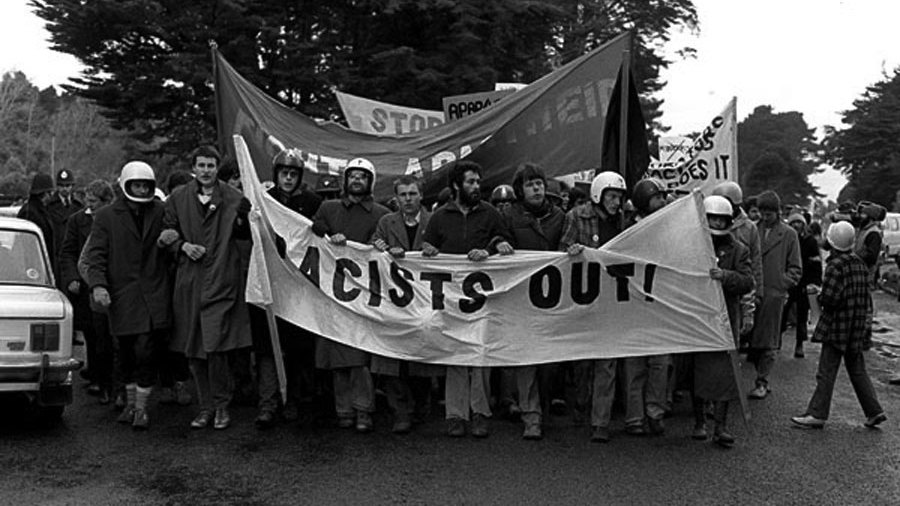|
New Zealand 25-22 South Africa, Eden Park, Auckland
The Flour Bomb Test
Richard Seeckts
September 12, 1981

A protester makes her views clear over the South African tour to New Zealand
© Getty Images Enlarge
New Zealand won the third and deciding Test in 1981 with an injury time penalty to take the series 2-1. So ended a Springbok tour that had caused the greatest civil unrest in New Zealand's history, with demonstrations and violence occurring wherever the South Africans went in 'a war played out twice a week'. In hindsight, it is remarkable the tour went ahead, with 14 matches played and two cancelled due to the protests. In 56 days, 150,000 people took part in 200 anti-apartheid demonstrations at 28 locations around New Zealand. 1,500 people were charged with offences, many were injured as police fought protesters hell-bent on stopping the matches being played. Public opinion was divided, however. Rugby die-hards believed that politics should not interfere with sport, a line also taken by Robert Muldoon's government in contravention to the Gleneagles Agreement of 1977. It stated that it was the duty of Governments "vigorously to combat the evil of apartheid by withholding any form of support for, and by taking every practical step to discourage contact or competition by their nationals with sporting organisations, teams or sportsmen from South Africa or from any other country where sports are organised on the basis of race, colour or ethnic origin." Political tension was immense. Peter Hain's 1970s 'Stop the Tour' campaign in the UK provided a blueprint for the protests, led by HART (Halt All Racist Tours). Some believed that a number of South African players were involved in white supremacist groups, but Naas Botha, the Springbok fly-half, said he believed all the players were against apartheid and had some sympathy with the protesters. He hoped the experience of the tour would change the attitudes of the South African public and Government. Nevertheless, All Black captain Graham Mourie and centre Bruce Robertson made themselves unavailable for selection against the tourists on political grounds. Andy Dalton assumed the captaincy.
With the series level, all parties stiffened their resolve prior to the decider. The Springboks spent the night before the match in makeshift accommodation at Eden Park to foil any disruption to their arrangements. A vast police presence prevented protesters on the ground from halting the match, though a number got into the stadium with smoke bombs and flares. All hell broke loose on the streets around Eden Park, as police were pelted with rocks and missiles. Some have since said that genuine protesters were joined by opportunists who simply wanted to fight the police. Above the stadium, a Cessna 172 piloted by Marx Jones flew dangerously low over Eden Park before and during the match, continually dropping flour bombs, smoke bombs and anti-apartheid leaflets. All Black prop, Gary Knight, was felled by a flour bomb in the second half, and though the Cessna continued to buzz the ground, referee Clive Norling and the players agreed to play on. "Apart from the demonstrations", the Times reported, "the match was full of drama. New Zealand led 16-3 at half-time, but just as full time was completed, South Africa wing (Ray) Mordt scored a try in the corner to level the scores." It was Mordt's third try, and scarcely can an international hat-trick have been so overshadowed by events. Botha, whose kicking throughout the tour had been prodigious, missed the conversion.
Knight and Stu Wilson had earlier scored tries for New Zealand with Doug Rollerson and Allan Hewson sharing the kicks. When Norling awarded the home team a penalty four minutes into injury time, it fell to Hewson to convert it from 35 metres out and claim the series. The fallout from the tour was considerable. South Africa's sporting isolation was almost complete. They didn't tour again until re-admission in 1992 came with the breakdown of apartheid. Only England, in 1984, and unofficial 'rebel' tours visited South Africa. Of the Springbok players, only Botha and Danie Gerber appeared on the world stage again, each playing a handful of games after re-admission before retiring in 1992, their best days behind them. The New Zealand public, divided and embittered by the experience, lost some of its passion for rugby until the 1987 World Cup revived spirits. Marx Jones, the Cessna pilot, went to prison for six months but was unrepentant. 
© Unknown
Enlarge
© ESPN Sports Media Ltd
| ||||||||||||||||||||||||||||||
Live Sports
Communication error please reload the page.
-
Football
-
Cricket
-
Rugby
-
- Days
- Hrs
- Mins
- Secs
F1 - Abu Dhabi GP
Abu Dhabi Grand Prix December 11-131. Max Verstappen ()
2. Valtteri Bottas (Mercedes)
3. Lewis Hamilton (Mercedes)
4. Alexander Albon ()
5. Lando Norris ()
6. Carlos Sainz Jr ()
-
ESPNOtherLive >>
Golf - Houston Open
Snooker - China Open
Tennis - Miami Open

